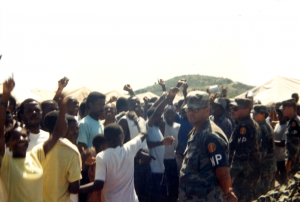Guantánamo and My Home
National Dialogue and Traveling Exhibit
I feel very fortunate to have been able to participate as a dialogue facilitator for the Guantánamo Public Memory Project as a student at Rutgers University. It has been one of the most fulfilling experiences of my college career thus far. Usually, before even beginning to discuss with others the premise of the project, I like to explain why I even became involved.
Growing up as a child of Afghan immigrants ultimately pushed me to become interested in issues of injustice that occur in the Middle East and that affect the diaspora. Before 9/11, nobody even knew where Afghanistan was. After 9/11, that completely changed and my parents’ homeland became demonized as the so-called “war on terror” was launched by the Bush administration. I as well as many of my friends and family members began to experience firsthand the discrimination that Muslim Americans and Middle Eastern/South Asian communities faced post 9/11.
Guantánamo, which is seen as a symbol of the war of terror, had a significant influence on the rise of Islamophobia in the United States since most of the detainees come from Muslim backgrounds. Before becoming involved with this project, I was most familiar with the narrative of the detainee or “terrorists” at Gitmo. Through this project, I have learned about other groups that have been detained at Gitmo including Cuban and Haitian refugees and how their stories and the history of Gitmo allows for a greater understanding of why conditions at Gitmo exist as they do today.
Often times, I have been met with the question of why do even bother to participate in projects such as this one because I am told I am in no position to change anything. I strongly believe that raising awareness is the crucial first step and that if I can influence just one person’s opinion or perspective on the issue, then that’s all that matters. Also, I want to assert the fact that every person’s voice does matter and that you can be a participant in the larger conversation about Guantánamo.
As a student, there are actions that we can take to raise awareness and we do have the power to have an impact on an issue that may at first seem very distant. The Guantánamo Public Memory Project has been a great model for me in creating a sense of student empowerment.
Hajar Hasani is an undergraduate student at Rutgers University in New Jersey.
Rutgers University is participating in the Guantánamo Public Memory Project‘s National Dialogue and Traveling Exhibit. Traveling to 12 sites (and counting) across the country through at least 2015, the exhibit will explore GTMO’s history from U.S. occupation in 1898 to today’s debates and visions for its future. The exhibit is being developed through a unique collaboration among a growing number of universities as a dialogue among their students, communities, and people with first-hand experience at GTMO.

